Featured Students: Osteopathic Medicine
ANNIE AU, FUTURE PHYSICIAN
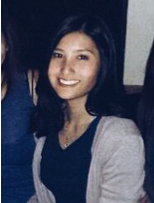 Hi, I’m Annie, 25, female and was an undergraduate at CSUF for 6 years (4 years to obtain my degree; deferred graduation to finish pre-med courses for the last 2 years). While at CSUF, I ultimately chose to explore the Health Science degree instead of settling for a Biology degree. The students and faculty that I have come across with during my time here were all supportive, but I can’t say that anyone really helped me get to where I am now. For 3 years, I was a part of the Health Science honors club, Eta Sigma Gamma. As soon as I found out that CSUF opened an AMSA chapter, I immediately joined as part of the first AMSA group at CSUF. I did not fill any lead positions, I was merely just a member reaping the benefits of what the club had to offer.
Hi, I’m Annie, 25, female and was an undergraduate at CSUF for 6 years (4 years to obtain my degree; deferred graduation to finish pre-med courses for the last 2 years). While at CSUF, I ultimately chose to explore the Health Science degree instead of settling for a Biology degree. The students and faculty that I have come across with during my time here were all supportive, but I can’t say that anyone really helped me get to where I am now. For 3 years, I was a part of the Health Science honors club, Eta Sigma Gamma. As soon as I found out that CSUF opened an AMSA chapter, I immediately joined as part of the first AMSA group at CSUF. I did not fill any lead positions, I was merely just a member reaping the benefits of what the club had to offer.
I chose to go into medicine because not only was there a yearning to help others, but I saw the goal as something that is mentally taxing and challenging, thus making the career that much more rewarding. I admired that it not only tested your own trust and confidence within yourself, but it constantly and consistently tests what you know. Peoples’ lives are literally in your hands and you have to be able to do what’s best in your own best judgment.
I volunteered at various hospitals since 2009. Eventually I ended up doing clinical care extender work at the Citrus Valley hospitals for 2 years. My first clinical job began in 2011 at San Gabriel Valley Medical Center. I was a part of the second group of scribes to have worked there. With persistence and hard work, I was given the opportunity to help start up the scribing program at Whittier Hospital Medical Center in 2013. Today, I am still with the scribing program until June 2015. Currently, I am chief scribe working closely with the medical director and C.O.O. of the AHMC hospitals.
The application process was tough for me. It took a lot of dedication to sit down for 4 hours a day to fill out these applications. I’m going to be very honest, I applied to nearly 40 schools, was invited to interviews at 7 schools, attended 4 interviews and turned down 3. I ended up getting accepted to the school of my very first interview in October, and was accepted to my second school of choice in January. It was a tough decision but I decided to attend Touro University of Osteopathic Medicine in Henderson, Nevada and I am extremely excited to start in August!
My advice to future pre-medical students is: keep going at it! Don’t quit! Ever! There will be people who will doubt you and there will be those who will tell you that “with your score, you’re not going to get anywhere.” Take it with a grain of salt if you must take a negative view from someone else’s perspective, but believe me when I say that you’re not going to get anywhere if you fall for those types of comments. Trust yourself. Work hard. Be persistent. If you want it enough, you will get there. And, please, do not ever settle for something that you did not initially have in mind. Keep striving!
JENNY VANG, FUTURE PHYSICIAN
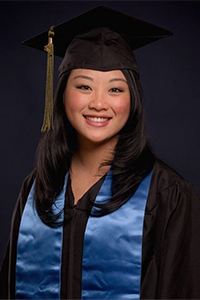 I finished my undergraduate studies at San Jose State University and received a B.S. in Heath Science with a concentration in Health Care Administration. Unsatisfied with my career, I reached out to a good friend and professor who encourage me to pursue a career in Osteopathic medicine. After hours of online researching, I found the Health Profession Certificate Program at California State University Fullerton and was captivated with their emphasis in Osteopathic Medicine. I knew this program was right for me and I am truly blessed to be a part of it.
I finished my undergraduate studies at San Jose State University and received a B.S. in Heath Science with a concentration in Health Care Administration. Unsatisfied with my career, I reached out to a good friend and professor who encourage me to pursue a career in Osteopathic medicine. After hours of online researching, I found the Health Profession Certificate Program at California State University Fullerton and was captivated with their emphasis in Osteopathic Medicine. I knew this program was right for me and I am truly blessed to be a part of it.
I chose Osteopathic Medicine because of its values in holistic and preventive care. As well as, the incorporated training of Osteopathic Manipulative Treatment (OMT), which is a therapeutic techniques that is very similar to my own cultural medical practices.
Before I started the program, I worked in various sector of the health care system. My first internship took place at Ford Family Surgery Department in Lucile Packard Children’s Hospital Stanford. I gained many clinical hours and was later hired. At another internship, I worked in the Emergency Room at Santa Clara County Hospital doing patient registration, and counseling for financial health coverage programs. I also volunteered in a Health Insurance Wellness Program assisting in many preventative care events.
The Pre-health Certificate Program is a very fast pace program. I started my first semester in August 2013 and applied for the linkage program by December 2013. I felt rushed applying to medical school, knowing I had only taken my general chemistry courses, but excited for such an opportunity. My first interview took place at beginning of the second semester and my second interview shortly afterwards. As the end of my first year finished, I received the best news ever, my linkage acceptance to the School of Osteopathic Medicine at Western University of Health Science.
Some advice for the application process is to have your official transcripts ordered and ready. Get your letters of recommendations done early as well. Also, have your personal statements read by friends, family, advisors, and professors who you believe will give you the best advices. I cannot stress enough that you should always practice, practice, and practice for the interview process.
This path, especially for career changer like myself, is a real test of character, self-reliance, and motivation. I learn so much about my strengths, weaknesses, and myself. While in this program, I made many lifelong friends, your cohort will be your support group. My best advices are: be self-discipline, focus on your goals, time management, and be prepare to make sacrifices.
Jason Darr, Future Physician
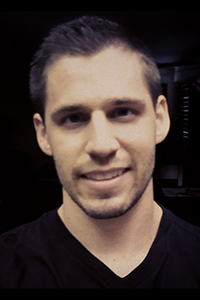 As of spring 2015, I will be a graduate in Biological Science with a concentration in Cell and Developmental Biology. In fall 2015, I will become an osteopathic medical student at the Alabama College of Medicine. I chose this osteopathic (D.O.) program because of the emphasis on underserved communities and the incorporation of osteopathic manipulative treatment (OMT) in addition to standard surgery and medicine.
As of spring 2015, I will be a graduate in Biological Science with a concentration in Cell and Developmental Biology. In fall 2015, I will become an osteopathic medical student at the Alabama College of Medicine. I chose this osteopathic (D.O.) program because of the emphasis on underserved communities and the incorporation of osteopathic manipulative treatment (OMT) in addition to standard surgery and medicine.
In preparation for a life in the hospital, I took part in many on-hands experiences. I volunteered at Kaiser Permanente for over 100 hours, and I also worked as a clinical care volunteer (CCV) at Riverside Community Hospital for over 500 hours. I definitely recommend students seek out a CCV program in order to not only gain valuable experience working with patients, nurses, and doctors, but to also ensure this is the right path for you. Also, shadowing an osteopathic orthopedic surgeon and watching numerous operations was one of the best and most rewarding experiences that helped shaped my path. Furthermore, research experience with a science professor is always a good idea.
Though there are many paths towards becoming a doctor, there is no one path that is right for everybody. Do not be hindered by ever thinking that it is too expensive, that you are too old, or that there is not enough time to achieve your dream of being a medical professional. Personally, I received three Associate Degrees at a community college, and I did not begin my undergraduate education until age 24. Clearly, I was the furthest thing from a “traditional” medical school applicant, but I know if I wanted it bad enough I could overcome all of these obstacles.
It is not money, age, or time that can prevent us from making a dream become reality. All it takes is patience, dedication, and perseverance. Don’t wait until tomorrow, don’t wait until the next semester, and don’t wait until the “right” time. The time to begin the pursuit of your dream is now, today is the day to build a new future.
Fortunately, there are an abundance of resources available at California State University Fullerton that can be utilized on this journey. CSUF’s science professors are the greatest assets that you can interact with on a daily basis, and all of them have a wealth of knowledge just waiting to be tapped. Letters of recommendation from science faculty are an absolute necessity for medical applications, so building these relationships as early as possible in your education is paramount. Another fantastic resource is the Health Professions Advising Office. They can not only assist in the application process from preparing for the medical college admission test (MCAT) to writing your personal statement, but they can also help decide which medical school is right for you. Additionally, though grades are undeniably important, they mean nothing if you interview poorly. Practice for the interview as you would study for the hardest test of your life. The Career Center conducts excellent Mock Interviews that I recommend everyone definitely make time for at some point in the application cycle.
It is not an easy journey, but you will do seemingly impossible things you never knew you were capable of doing. Use your resources, start early, and try to enjoy the process as much as possible. You will make lifelong friends, gain an untold amount of knowledge about yourself and others, and you will come to see just how meaningful of an impact you can have on a person’s life.
Alesha Scott
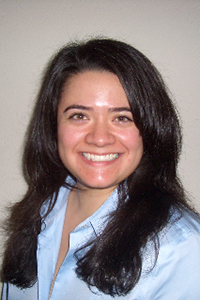 I just finished my second year pursuing a DO degree at Touro University Nevada College of Osteopathic Medicine (TUNCOM), the largest medical school in Nevada, which is located in Las Vegas. I will be graduating in 2011; as of now I have not yet chosen a specialty. I am excited to start rotations this Summer and put my clinical knowledge into action!
I just finished my second year pursuing a DO degree at Touro University Nevada College of Osteopathic Medicine (TUNCOM), the largest medical school in Nevada, which is located in Las Vegas. I will be graduating in 2011; as of now I have not yet chosen a specialty. I am excited to start rotations this Summer and put my clinical knowledge into action!
As a brief background, after graduating from CSUF with a B.S. in Biological Sciences and minors in Chemistry and Spanish in January 2005, I took a few years off to work in health care. I was an oral surgery assistant and then an andrology/embryology technician for a reproductive endocrinologist. I also volunteered at Queen of the Valley Hospital in West Covina as a Clinical Care Extender. This program is amazing, and you really get to be hands-on with patients in all units of the hospital. Volunteering there was one of the greatest experiences I had, and helped me see what I enjoy most about medicine. I am grateful I had life experiences between my undergraduate and graduate educations, because the time I spent learning real-world application of knowledge has given me an advantage in my clinical courses at Touro Nevada.
I love TUNCOM, and the opportunities to make a difference in the community are endless. Although Las Vegas is one of the largest tourist destinations of any US city, Nevada is a terribly underserved state with great need for health professionals. Touro University Nevada College of Osteopathic Medicine (TUNCOM) is a tight-knit community of students and faculty, and my favorite part of the education I’m receiving is the family feel of the campus and the close relationships I’ve made.
I am incredibly happy with my choice to become a DO, and if given the opportunity to do it over, I would absolutely repeat my decision. Osteopathic medicine is the same as Allopathic medicine in that DOs and MDs are both the only fully licensed physicians in the U.S. who can prescribe medications, perform surgeries, and work in any specialty. What’s great about Osteopathy is that there is a different emphasis—DOs are trained to see patients as whole human beings with careers, relationships, feelings, and personal beliefs. DOs also learn Osteopathic Manipulation, which is a form of manual medicine that focuses on the musculoskeletal system and the body’s self-healing properties. Osteopathic Manipulative Medicine (OMM) is an invaluable tool for diagnosis in addition to an accurate history and physical exam, and it’s really awesome to be able to treat someone right there in your office and see immediate relief for countless physical complaints.
If you are interested in learning more about Osteopathy or TUNCOM, or want to talk about healthcare in general to see where you best fit in, please feel free to get in touch with me!
An Nguyen
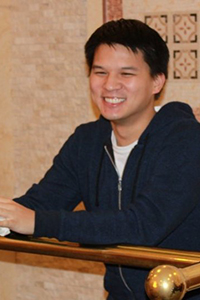 Like many of the people featured before me, I would consider myself a non-traditional student in many aspects. I graduated from college with a B.A. in Asian Humanities in 2005, but only after much time and deliberation did I find a calling into the medical field. As a post-baccalaureate student, it was difficult transitioning into a full-time curriculum consisting purely of difficult science courses when you are single and economically self-reliant. Were it not for the tremendous support from Dr. Goode and the rest of the staff at the CSUF Health Professions Office, I would not have made it as far as I did.
Like many of the people featured before me, I would consider myself a non-traditional student in many aspects. I graduated from college with a B.A. in Asian Humanities in 2005, but only after much time and deliberation did I find a calling into the medical field. As a post-baccalaureate student, it was difficult transitioning into a full-time curriculum consisting purely of difficult science courses when you are single and economically self-reliant. Were it not for the tremendous support from Dr. Goode and the rest of the staff at the CSUF Health Professions Office, I would not have made it as far as I did.
The first thing that I noticed when I started at CSUF in 2008 was how parts of the school were so cold and dispassionate at times. With one of the highest student enrollments in the world, it's no surprise that you can feel like just a number to the administration. However, when I began visiting the Health Professions Office for advising, I felt like I was treated as a real person there, and my concerns heard out and dealt with whenever I voiced them. I always felt so at ease when I stepped into the office, as if it was my sanctuary from the more dour parts of campus.
Although every person in the office deserves praise, Dr. Goode is the A-list star of the show. I have not met anyone with more devotion, compassion, and willingness to see students succeed than her. Her direct and no-nonsense approach to things might be uncomfortable for some, but I challenge you to find someone who is more well-meaning and knowledgeable than her. I do not consider myself an excellent student with high numbers or great accomplishments to my name, but Dr. Goode still helped me break down barriers that I could never have imagined overcoming. For that, I am eternally grateful.
Just 3 years ago, the thought of becoming a doctor was impossible to me. However, I realized that you really don't know what you're capable of unless you give it an honest attempt. “The journey of a thousand miles begins with a single step,” after all. As I start medical school this fall at Western University of Health Sciences, I will always keep in my heart the challenges and the support that were necessary for my success. I have always been a firm believer that you cannot do everything alone. Despite the ironically competitive path it takes to get there, work in the medical field is a collaborative effort, and the Health Professions Office has taught me the true meaning of helping others.
Since the previous Student-of-the-Weeks all had great advice to consider, I just wanted to contribute one thing:
Never forget that behind every exam, campus, interview, office, task, application form, job, or e-mail address, there is a real person with real feelings on the other end somewhere. Be kind to everyone you meet along your path, for when your time of need comes, they will treat you with the same compassion.
Chetan Gairola
I graduated from high school about six years ago. I did not know what I wanted to do in life until almost three years ago. During my undergraduate career, I switched from English, Psychology, Undecided, Physician Assistant, until finally settling on becoming a physician, with an undergraduate focus in Biology. This decision came from my summer program at UCLA, known as the Summer Medical and Dental Education Program (SMDEP), which convinced me that there is a need for physicians in the community, and that I can be just as capable as anyone else. After one last semester at my junior college, I transferred to Fullerton, and I have never regretted it.
Fullerton has given me everything I needed to prove myself and become an applicant that could get into medical school. I have community and clinical volunteer work, research regarding the cranial endothermic heat source in Albacore, officer work in the Student Health Professions Association, and mentoring under my belt. I was lucky to obtain wonderful advisement from my research advisor, Dr. Dickson, as well as my biochemistry professor and pre-medical advisor, Dr. Goode. Meet and know your professors, especially the ones who want you to succeed. Through SHPA, I was able to belong to a community of students who had common goals and would have to undertake the same hardships and stress that I would. It was a good support system, and one that educated me as to what else was out there. Medicine wasn’t just medicine, it was a plethora of disciplines that, eventually, I would have to pick just one from. This was both an exciting, as well as another stressful thought.
It has been a long journey, and it is humbling to realize as I leave this chapter behind, a new, much longer chapter is opening up before me. I know this will fly by, and soon enough, I will be treating patients. I will be attending Touro University (Vallejo, CA campus) in August of 2009 as part of the Class of 2013. I hope my advice and mentoring will be remembered and taken into account by the current students who I leave behind and that they will become the competitive applicants I hope for them to become.
Christine Kassissa
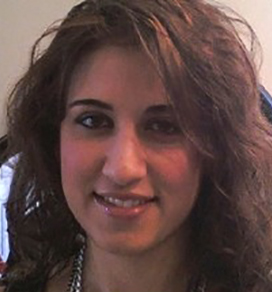 I graduated from CSUF in 2009 with a B.S. in Biology. I double minored in Chemistry and Health Science. My path to becoming a physician started early in my college career. Make use of the Health Professions Office as early as possible. You may think you only need advice when you're ready to apply- don't make that mistake. As a freshman, I was given a list of courses to take and a timeline to follow. It is definitely easier when you have a plan. During my first year at CSUF, I joined SHPA to interact with other students interested in the health professions. There is a camaraderie between students at CSUF, so get involved and network with students as they can be a valuable source of information on volunteer opportunities, the application process, etc…I also joined the National Society of Collegiate Scholars and Golden Key International Honors Society. In addition, I participated in two years of BioChem research under Dr. Linder, where I studied copper metabolism in relation to lactation.
I graduated from CSUF in 2009 with a B.S. in Biology. I double minored in Chemistry and Health Science. My path to becoming a physician started early in my college career. Make use of the Health Professions Office as early as possible. You may think you only need advice when you're ready to apply- don't make that mistake. As a freshman, I was given a list of courses to take and a timeline to follow. It is definitely easier when you have a plan. During my first year at CSUF, I joined SHPA to interact with other students interested in the health professions. There is a camaraderie between students at CSUF, so get involved and network with students as they can be a valuable source of information on volunteer opportunities, the application process, etc…I also joined the National Society of Collegiate Scholars and Golden Key International Honors Society. In addition, I participated in two years of BioChem research under Dr. Linder, where I studied copper metabolism in relation to lactation.
Throughout my five years at CSUF, I was associated with Student Science Alliance, Colleges Against Cancer, and Flying Samaritans. I took on Flying Samaritans as my cause and became Fundraising Chair for the organization. I also volunteered at the Lennox Health Fair, Loma Linda Ronald McDonald House, VNA & Hospice of Southern California, and Santa Monica UCLA Medical Center as a Clinical Care Extender. In addition, I shadowed various physicians, both allopathic and osteopathic, specializing in Internal Medicine, Family Practice, Osteopathic Manipulation, General Surgery and Vascular Surgery. I am currently taking an EMT course as I wait to join Western University's class of 2015.
Why DO?
I chose osteopathic medicine because I was attracted to the holistic, patient-centered, hands-on approach to diagnosing and treating diseases. I appreciate that Osteopathic Philosophy emphasizes that the body has a natural ability to heal itself and that structure and function are inter-related. Osteopathic Physicians also put extra emphasis on health education, injury prevention, and disease prevention. Rather than simply treating patients, Osteopathic physicians stress promoting wellness by helping patients with lifestyle and attitude changes that will positively affect their health and prevent disease. Overall, as an osteopathic physician I will be able to provide my patients with the most comprehensive care as I will be trained in all aspects of medicine with the advantage of osteopathic manipulation.
Application Process:
Start your application early and review it with the Health Professions Office. Take advantage of the support system you have at CSUF. Dr. Goode has tremendous experience and will help you in any way possible. Also, get to know your professors. Letters of Recommendation can make a big difference when a professor knows you and believes you can succeed. I was lucky enough to have the support of Dr. DeLijser, who provided me with advice and supported me throughout the application process. The earlier you submit your application, the greater your chances are for an interview. I submitted my primary application mid July, and started receiving secondary's in August. Do not copy information from your personal statement to complete your secondary applications. The point is to elaborate and share information that you did not have room for on your primary application.
Interview:
Relax and be yourself. Be proud of your accomplishments; you already look good on paper, now the school wants the opportunity to get to know you. Show your personality and answer questions honestly. Always focus on the positives and don't end with a negative impression. Have an explanation for weak points in your application, such as a low score on a portion of the MCAT or a grade that does not seem to coincide with your overall GPA. There is no such thing as a perfect applicant; just do your best.
Advice:
- Try to get as much clinical exposure as possible, as it will reaffirm your desire to pursue a career in medicine. Don't do it simply to have a longer list of activities on your application. Volunteer in areas you enjoy and use each opportunity as a chance to learn something new.
- Don't under-estimate the importance of your MCAT and GPA. I was told at interviews that schools put your numbers in a computer, which weeds out students. Thus, while extracurricular activities are important, they do not outweigh the numbers.
- Don't give up on your dreams!
Edward Lin
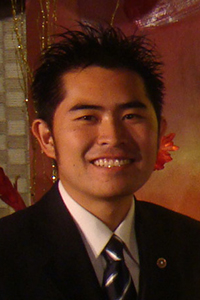 As a non-traditional applicant, my life is filled with a variety of different experiences. I am a first-generation immigrant, and was raised and born in Taiwan. I lived there until the age of 16, when I moved to the United States with my siblings. I received my bachelor’s degree in business and political science from UC-Riverside, and worked in the private sector for two years. Before I decided to pursue medicine, I was a long time participant in community services. My passion to serve was eventually recognized when I received the “Outstanding Youth Leadership Award” from the City of Monterey Park and California State Senate. This experience resulted in my determination to further serve my community.
As a non-traditional applicant, my life is filled with a variety of different experiences. I am a first-generation immigrant, and was raised and born in Taiwan. I lived there until the age of 16, when I moved to the United States with my siblings. I received my bachelor’s degree in business and political science from UC-Riverside, and worked in the private sector for two years. Before I decided to pursue medicine, I was a long time participant in community services. My passion to serve was eventually recognized when I received the “Outstanding Youth Leadership Award” from the City of Monterey Park and California State Senate. This experience resulted in my determination to further serve my community.
During the year of 2008, I entered University of Southern California to pursue a Master’s degree in Public Policy and Management, with the concentration in health policy. Being a student leader in my program, I was frequently asked to join professors, government officials and physicians to educate local residents about how the American Healthcare Reform would impact healthcare to individuals. While I did well in presenting policy matters, I was often approached by audiences seeking specific medical questions at the end of the presentation. Wanting to help, I felt motivated to explore medical science through personal research. As I got more deeply involved with medical knowledge, I felt moved and inspired. Instead of addressing one’s medical need indirectly through public policy, I want a profession where I can resolve such need directly. I am determined to become a physician.
After graduating from my Master’s program in 2009, I spent the following years attending CSU-Fullerton’s Post-Baccalaureate Pre-Medical Program. My experience here at CSU-Fullerton was wonderful. The rigorous program not only provided me with a pathway to the field of medicine, it also prepared me with the necessary knowledge and experiences for future medical trainings. Thanks to Dr. Christina Goode, Health Advising Office staffs, and my cohort classmates, I was able to get all the support that I needed; I was never alone on my journey. As of 2013 spring semester, I am teaching chemistry lab at CSU-Fullerton, and will be starting my osteopathic medical education in summer.
Why Osteopathic Medicine?
I decided to pursue osteopathic medicine because I am enthralled with osteopathic doctors’ patient-centered, holistic approach of treating diseases. Through my life encounters, I have developed great sensitivity to individuals, and have acknowledged that each person is truly unique. I feel that an effective medical treatment is not only based on evaluation of patient’s physical condition, but also psychological and spiritual well being. I look forward to becoming a well-rounded physician that can serve patient’s needs.
Clinical Experiences:
I attended and completed the Clinical Care Extender internship program. In my fifteen-months of experiences, as an intern, at Riverside Community Hospital, I participated in four different departments: general nursing floor, surgical nursing floor, emergency department, and intensive care unit. I also shadowed two osteopathic physicians and one allopathic physician.
Application Process:
I took my MCAT on 5/12/2012, and submitted my primary application on 7/11/2012. My profile was verified on 8/14/2012. After working on supplemental applications for a month and half, I received my first interview invitation on 9/24/2012, in which the interview was scheduled for 11/1/2012. And finally, my first acceptance came on 11/7/2012.
Advise:
- Utilize all the resources from CSUF Health Advising Office. Dr. Goode is truly an expert in health professional application process; she can help you to make strategic right decisions.
- Apply early, apply early, and apply early. Medical schools are all rolling basis; first come first serve.
- Time management is the key in succeeding classes, don’t let workloads stack up.
- If you can, take a light semester to study for MCAT. It is very intense. Minimize distractions while preparing.
- Trust yourself, have faith, do not give up, and continue to fight on. Step by step, eventually, you will reach your goal. All the hard work will pay off!
Hailey Cochran
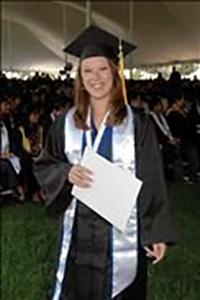 Like most children, I was asked, "What do you want to be when you grow up?" hundreds of times throughout my childhood. At first, I simply answered with whatever career choice sounded good that day. However, around the age of ten, I was exposed to hospital settings and discovered that I absolutely loved helping and spending time with patients. From that point on, my response to the question of my desired future occupation elicited a resounding "I am going to be a doctor when I grow up!" I have since been on a direct path to a career in the medical field.
Like most children, I was asked, "What do you want to be when you grow up?" hundreds of times throughout my childhood. At first, I simply answered with whatever career choice sounded good that day. However, around the age of ten, I was exposed to hospital settings and discovered that I absolutely loved helping and spending time with patients. From that point on, my response to the question of my desired future occupation elicited a resounding "I am going to be a doctor when I grow up!" I have since been on a direct path to a career in the medical field.
It was not until these last few years that I have really taken the time to sit down and analyze what it is within me that causes me to be drawn to a career in medicine. While it is true that the money and prestige are incredibly appealing, they are not why I have chosen this path. The very thought of being a doctor, or even the mention of medical topics, stirs up a passion in me unlike anything I have ever felt before. I am completely enthralled by how our bodies work, and I cannot wait to spend the rest of my life trying to uncover its mysteries!
My interest in medicine was first kindled when I was given the opportunity to volunteer at the Veteran's Affairs Hospital in Topeka, Kansas. My aunt is a recreational therapist at the VA, and often let me accompany her to work. The joy that came from being able to put a smile on the faces of those veterans was magical! It was during these visits that I realized I am meant to spend my life working to better the lives of others.
Throughout the years, I have continued to volunteer at various hospitals and with multiple organizations such as Silverado Hospice. Spending time with patients has enriched my life and reassured me that I am choosing the right career. One of the most amazing experiences of my life was made possible through volunteer work. Last summer, I was given the opportunity to travel to Honduras as a member of the Global Medical Brigade organization. My colleagues and I travelled to rural villages in the mountains of Honduras and set up free clinics for the townspeople. We handed out medicine, vitamins, and clothes, courtesy of the United States. It was incredible to see how appreciative these people were not only for the material gifts we gave them, but even more so for the basic healthcare we provided, something many Americans take for granted. We saw many children who had never before seen a physician, not even when their mothers gave birth; and many people were treated for parasite infestation. We dealt with many health issues that would never threaten Americans, but that caused serious illnesses in the villagers. Being able to make their lives a little bit easier was an awesome experience, and I cannot wait to go on more brigades such as this one!
My pursuit of a career in medicine has taken me far away from my hometown of Topeka. With the hopes of expanding my horizons, I decided to move from Kansas to California, where I became part of a molecular biology research lab. My colleagues and I worked with mouse embryonic stem cells in order to gain a better understanding of the cellular pathways that maintain pluripotency. The time I spent doing research opened my eyes to how intricate and amazing the human body truly is. I feel that the knowledge I gained from these experiences will help me to become a more well-rounded physician.
I know that the journey to becoming a doctor is not an easy one, yet I am ready for the challenge. My school work, volunteer experiences, and extracurricular activities have helped prepare me for the obstacles ahead. Armed with my determination, and the love and support of my friends and family, I have what it takes to become an extraordinary member of the medical care community.
Kam Haghayeghi
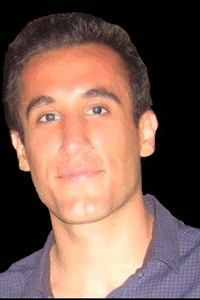 Before I begin, I'd like to thank Dr. Cuajungco Dr. Filowitz, Dr. Freeman, Dr. Goode, Dr. Hyland, Dr. Norton, Dr. Ow, Dr. Shamloo, Julie Stern, Dr. Varallo, and Dr. Walker. Without your support and constructive criticism, I wouldn't be where I am today.
Before I begin, I'd like to thank Dr. Cuajungco Dr. Filowitz, Dr. Freeman, Dr. Goode, Dr. Hyland, Dr. Norton, Dr. Ow, Dr. Shamloo, Julie Stern, Dr. Varallo, and Dr. Walker. Without your support and constructive criticism, I wouldn't be where I am today.
Hello all! My name is Kam Haghayeghi and I'm an alumnus of CSUF. I am a first generation Iranian-American and the first person in my family to apply to medical school. My family has a rich history rooted in military, science, and art. I often see my family's passions and values reflected in my own characteristics. My organization and strategic approach to challenges is almost militaristic. My passion for science and my visualization of medicine as an art also seems to stem from familial roots. Family, friends, and my career are the most important aspects of my life. For fun, I enjoy playing music, exercising, and spending time with those I love. That's enough about my personal life … let's talk about medicine!
Why I chose to become a physician:
I decided to become a physician when I was 17. My personal experiences with doctors had swayed me towards looking into medicine, and an anatomy class in high school further fueled my interest. At 17, I only had a vague idea of what it meant to be a doctor. I consulted an old family friend/physician and mentioned my aspirations. He told me a few words that I'll never forget. I want everyone to take the following words into great consideration:
"Only consider medicine if your heart is truly in it. ... If it is your passion. ... And you absolutely love it, Compassion and a love of science are essential. if you're thinking about getting into medicine for the pride, prestige or money. ... You will be miserable -- Dr. James Shamloo, 2004
I have a great desire to make a difference in people's lives. I feel that helping others heal is a very fulfilling experience. Furthermore, I have an insatiable appetite for learning science. Therefore, medicine combined two of my biggest passions into an all-inclusive career. Medicine is my ideal job. Now I want you to stop and ask yourself … “Is medicine the ideal job for me?”
My experience at CSUF/Advice for Students:
CSUF is a great school with many unique benefits. Throughout my undergrad years, CSUF professors have provided me with much needed moral and academic support. The students at CSUF have also been very supportive and were always willing to lend a helping hand if I was having trouble academically or emotionally. Last but not least, the HP advising office guided me through the rough path of applying to medical school. Without the help of professors, students, and the HP advising office, my road to reaching my career goals would have been much more difficult.
I have a few more words for those of you considering medicine. Becoming a physician is a life-long commitment. The path of getting accepted into medical school is a tough one, and it only gets harder. As an undergrad, you must accrue hundreds of hours of meaningful volunteer experience. You need to shadow doctors, work in hospitals, and talk to healthcare professionals. Find out if medicine is really the career and lifestyle you're looking for. You must maintain a high GPA and receive a decent score on your MCAT. Research experience is important as well. Also, get to know your professors. Show them that you are a capable and intelligent individual. When they write your letters of recommendation, your relationship and impact on your professors will shine through. Medical committees will be able to tell if you're the real deal through the words of your professors. Much of the time, letters of recommendation can make you or break you. Make the effort and you will reach all your goals. Determine if medicine is really the route you want to take. Are you compassionate? Do you have an innate desire to help others? Do you love science? If you answered yes to these questions, you most likely have the qualities necessary to make a good physician.
I have faith in all of you future doctors and health professionals. One day, you will be performing surgery, prescribing medications, and changing the lives of your future patients. Don't let the difficult path discourage you. Fight on … and you will reach your dreams!
Best wishes,
Kam Haghayeghi
November 3rd, 2010
CSUF C/O 2010
Nima Moradin
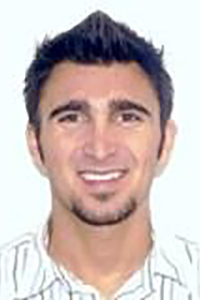 I am in the Class of 2012 at Western U in Pomona. I applied to about 45 MD schools and 10 DO schools. I was invited for interviews at 2 MD schools (UCI and West Virginia - waitlisted at both) and most of the DO schools. My GPA was about a 3.5 and I got a 29 on my MCAT (12Bio, 10Phys, 7 Verb).
I am in the Class of 2012 at Western U in Pomona. I applied to about 45 MD schools and 10 DO schools. I was invited for interviews at 2 MD schools (UCI and West Virginia - waitlisted at both) and most of the DO schools. My GPA was about a 3.5 and I got a 29 on my MCAT (12Bio, 10Phys, 7 Verb).
Scholastics
I went to High School in Oregon, junior College in Irvine AA in General Studies, BS from CSUF in Biology (no emphasis) and minor in Chemistry, MS in Food Science and Nutrition at Chapman. I also spent a summer abroad in Italy with John Cabot University.
Volunteering/Shadowing
250+ hours as Nurse's Assistant at CHOC in Heme/Onc. 35 day international volunteer trip to the Dominican Republic through www.isvonline.com (highly recommend). I shadowed a local ophthalmologist for several months.
Research
A few years in Dr. Sean Walker's Lab at CSUF. I was involved in a few small projects with poster presentations. I did publish in his lab as a primary author in January of 2008. Start research early because the whole process is very lengthy - it took nearly a year for my publication to finally hit printing after submitting a manuscript.
Work
I worked various retail jobs for many years. I tutored sciences for a while and had a Chemistry Lab Tech position for about a year.
Extra Curricular
I was way too involved, I put this last on purpose. I will be the first to tell you that being involved is a good thing, but there is a line that must be drawn. Just to hit a few of the big things I was involved with; I founded and/or led various clubs. I started the Lacrosse team at CSUF, I was in just about every science related club, I sat on ASI for 2 years w/ a host of committees and the list goes on. Pick a few that you love and go big with them. The rest is just unnecessary fluff.
Please feel free to contact me. My girlfriend goes to Temple (MD school in Philly) as a 2012 grad too, so I have a unique aspect to compare both of our curriculum at the same time.
Rachel Kaplan
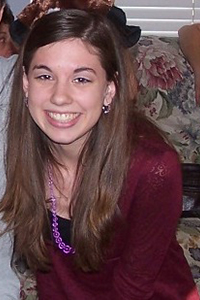 My name is Rachel Kaplan and I graduated from CSUF with my BS in Biochemistry in May of 2008. My best advice to anyone that wants to go into medicine is that you are sure this is the field you will enjoy pursuing for the rest of your life. One beneficial way to determine this is to volunteer in a hospital for at least one year. To truly find out if you want to follow this field for the rest of your life, you need to witness the blood and guts of a hospital setting, enter that fast-paced environment, and experience the blessings and sorrows of this profession. For the 4 years I volunteered as a Clinical Care Extender at St. Mary’s Medical Center, I solidified my dreams of becoming a physician. I have experienced just about every floor of the hospital, and have had many life changing experiences that have truly helped me discover my calling to medicine. Although grades and the MCAT are important, volunteering is the key to determining if medicine is for you.
My name is Rachel Kaplan and I graduated from CSUF with my BS in Biochemistry in May of 2008. My best advice to anyone that wants to go into medicine is that you are sure this is the field you will enjoy pursuing for the rest of your life. One beneficial way to determine this is to volunteer in a hospital for at least one year. To truly find out if you want to follow this field for the rest of your life, you need to witness the blood and guts of a hospital setting, enter that fast-paced environment, and experience the blessings and sorrows of this profession. For the 4 years I volunteered as a Clinical Care Extender at St. Mary’s Medical Center, I solidified my dreams of becoming a physician. I have experienced just about every floor of the hospital, and have had many life changing experiences that have truly helped me discover my calling to medicine. Although grades and the MCAT are important, volunteering is the key to determining if medicine is for you.
Now that you have received a little advice, I will tell you about myself and my journey to the place I am in today. While doing my undergrad at CSUF I worked in Dr. Chandra Srinivasan’s research lab for 5 years, I was the president and vice president of the Chemistry and Biochemistry Club at CSUF, I have shadowed an osteopathic physician in his family practice, I volunteered at St. Mary’s Medical Center, and served on the leadership team at St. Mary’s as an Assistant Director of the program. Another bit of advice, get involved as much as you can in school and health related avenues. This will show medical schools that, one, you can handle a heavy load of responsibilities, and two, you care enough about the field you are entering that you will dedicate your free time into learning more about it. Once I graduated, I took a year off of school and became a general chemistry lab instructor at CSUF. This experience has been very worthwhile because now I know I can take a subject that I am familiar with and explain it to others. That is, essentially, what doctors will be doing on a daily basis and being able to practice these techniques has been invaluable.
On top of being involved and looking good on an application, my last bit of advice for a premed student is to do something that you enjoy outside of the science and medical realm. Pick up a hobby, exercise, read a book for fun; something that allows you to relax and focus on yourself. This activity for me has been singing. Since childhood I have been singing in choirs, musicals, and other various arenas. I am currently in a Christian rock band at my church called Ablaze, where I am one of the lead singers. Each week, no matter how busy I get with school and extracurricular activities, I set aside time to practice with my band and perform each Sunday for church. It is something I love to do and allows me let loose and have fun.
My path to becoming an osteopathic physician has been a growing experience and has taken many turns, but through persistence and hard work, I was able to make my dream a reality. In August of this year I will be attending Touro University, an osteopathic medical school in Nevada. I am very excited to begin my career and hope to become a family practitioner.
I wish everyone good luck on their future goals and remember to keep working at that dream!
Scott Buzin
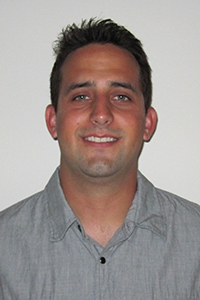 I would like to thank Dr. Goode, Julie Stern, Dr. Walker, and the rest of the health professions office staff.
I would like to thank Dr. Goode, Julie Stern, Dr. Walker, and the rest of the health professions office staff.
My non-traditional path toward medical school has taken many turns, all of which I am thankful for and would never change. I originally planned to go to physical therapy school, so my undergraduate experiences were geared in that direction. I worked at a few different physical therapy clinics while completing thousands of clinical hours in the athletic training room at Cal State Long Beach. I received my B.S. in Kinesiology: Athletic Training in 2007, and shortly after passed my comprehensive exam to become a Certified Athletic Trainer.
Following graduation, I made a decision to move to New Zealand. I wanted the opportunity to immerse myself in a culture I was not familiar with. I was lucky enough to find a job within the tourism industry, which allowed me to travel the entire country and meet lifelong friends. I returned home to California after about a year, and set my sights on a career in medicine in order to expand upon my previous experience as an allied health care professional.
Contacting the health professions office at CSUF regarding the post-baccalaureate program was one of the best choices I made. I was immediately set up with a plan to achieve my goal of becoming a physician. Throughout my tenure at CSUF I was involved with many different extra curricular activities. I volunteered as a clinical care extender at St. Mary Medical Center and also participated on their leadership team. In addition, I was involved with methanopterin biosynthesis research under the direction of Dr. Rasche who is an amazing mentor for anyone interested in getting a great research experience. Furthermore, I had leadership roles in both AMSA and SHPA and occasionally took trips to Mexico with Flying Samaritans. One of my favorite experiences was working with the Special Olympics. I was fortunate to volunteer at local events as well as coach many athletes.
The application process is daunting and at times may seem never-ending. Although it may be stressful, think of it as minor stepping stone on your path toward your future career. As most people have probably told you by now, apply early as it will give you the best chance of admission.
Gaining entry into medical school requires a lot of hard work and dedication, but by no means is it impossible or even improbable. The key is to set your goals high, do everything you can, and never give up. Everyone will stumble at some point, whether it’s bad grades, poor MCAT scores or failure to gain experience. The important thing is that you are willing pick yourself up, work hard, and keep pushing forward. Everything will work out in the end
Sithel Sar
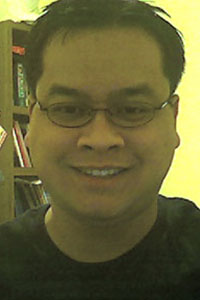 I graduated from UC Irvine in the spring of 2003 – my degree was in Economics with a concentration in mathematical and econometric analysis. Economics appealed to me because I was interested in understanding ways to allocate scarce resources creatively and effectively among their alternative uses. The study of economics also provided me with a framework through which to understand poverty and the socioeconomic issues affecting minority and immigrant populations. It was my desire to help these populations achieve better lives, and as my education continued this goal slowly shaped into a desire to help them through medicine.
I graduated from UC Irvine in the spring of 2003 – my degree was in Economics with a concentration in mathematical and econometric analysis. Economics appealed to me because I was interested in understanding ways to allocate scarce resources creatively and effectively among their alternative uses. The study of economics also provided me with a framework through which to understand poverty and the socioeconomic issues affecting minority and immigrant populations. It was my desire to help these populations achieve better lives, and as my education continued this goal slowly shaped into a desire to help them through medicine.
The turning point occurred late in college my college career, when I took an internship at the United Cambodian Community (UCC) center, a non-profit organization that works with the underserved and indigent. During my time there, I became aware of the unique health care disparities existing within underserved groups that were exacerbated by a lack of financial resources, along with prevailing cultural and language barriers. At the time, there was very little we as volunteers could do to improve their economic conditions, but we did to a great deal to educate community members about the importance of preventative care and early screening for diseases. I began to aid in organizing health fairs by contacting local hospitals and social services agencies to come and provide free information and educate the community about diseases such as diabetes and high cholesterol, conditions that were common in poorer communities. At these fairs, patients deemed at risk for these diseases were given a list of free clinics in the area that they could go to for further medical care. I continued to hold these healthcare fares because I saw how much it meant to the people who attended.
My time at the UCC revealed to me the unique healthcare needs of this community and the dire shortage of qualified individuals who understand those needs. As a physician, I will rely on my dual American and Cambodian heritage to bridge the cultural divide that prevents this community and other minority groups from obtaining and accepting the care they need and deserve. In pursuit of this objective I set to work on completing the medical school prerequisites at California State University-Fullerton immediately following my graduation with a B.A. in Economics. At the same time, I worked as a student researcher in a membrane receptor lab, where I was the first in our group to show an increase in tyrosine phosphorylated proteins following fertilization in the sea tunicate. The chance to apply classroom theory to laboratory research allowed me to appreciate scientific principles within a larger context.
In the fall, I will be attending osteopathic medical school. I have always grown up with a sense of social responsibility, and so when I decided on a career in medicine I was drawn to the community focus of the osteopathic philosophy – its emphasis on the role of the primary care physician within the healthcare system and its patient-centered, holistic approach to treating illnesses. With the training I will receive in osteopathic medical school, I hope to make a difference in the health and well-being of my community through holistic medical care that attends not only to the whole individual, but also to the individual's environment context.
Sula Safar
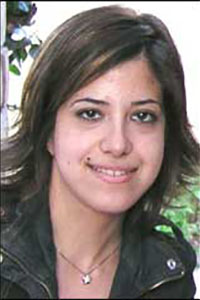 Sula Safar is a biological science major, with a minor in law, politics, and society. She has been a member of various clubs: The President’s Scholars club, Phi Eta Sigma, University Honor’s Society, Families Across Cultures, Golden Key International Honor Society, and Student Health Profession Association. She has been social chair of the President’s Scholars Club and Phi Eta Sigma. Sula has won several scholarships/awards including: President’s Scholars program/scholarship, Exemplary Leadership Award from CSUF’s Student Leaders, Arab American Educational Foundation Scholarship, Volunteer Excellence Award from Pomona Valley Hospital, Who’s Who Among Students in American Universities and Colleges, and President’s Associates Service Award. She has graduated with University Honors and will be entering Western University’s College of Osteopathic Medicine of the Pacific.
Sula Safar is a biological science major, with a minor in law, politics, and society. She has been a member of various clubs: The President’s Scholars club, Phi Eta Sigma, University Honor’s Society, Families Across Cultures, Golden Key International Honor Society, and Student Health Profession Association. She has been social chair of the President’s Scholars Club and Phi Eta Sigma. Sula has won several scholarships/awards including: President’s Scholars program/scholarship, Exemplary Leadership Award from CSUF’s Student Leaders, Arab American Educational Foundation Scholarship, Volunteer Excellence Award from Pomona Valley Hospital, Who’s Who Among Students in American Universities and Colleges, and President’s Associates Service Award. She has graduated with University Honors and will be entering Western University’s College of Osteopathic Medicine of the Pacific.
"Since i was 5, it has been my dream to become a doctor. the Health Professions Office has helped me achieve that dream by helping me finish my applications, preparing me for my interviews, and giving me the emotional support I needed during the application process. they have organized the application process so that applying for medical school is no longer stressful or complicated," she said.
Sul Safar
Theresa Portugal
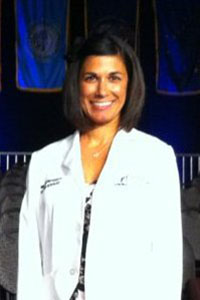 When I originally went into college after high school, I went in as a bio major, ready to begin on my journey to medical school. However, during college my eyes were opened to many things, and as life often does, things took a detour and I ended up going in a much different direction than I anticipated and graduated with a degree in Sociology. I never really lost interest in medicine and the sciences that surrounded it, and I knew I wanted to work in the helping professions, but I felt that I had a lot left to experience and explore before I made any decisions. I began working at a mental health clinic as a case manager and a couple of years later I pursued my special education teaching credential and began teaching middle school and high school children with severe emotional and behavioral disturbances in order to work more closely with this very at-risk population.
When I originally went into college after high school, I went in as a bio major, ready to begin on my journey to medical school. However, during college my eyes were opened to many things, and as life often does, things took a detour and I ended up going in a much different direction than I anticipated and graduated with a degree in Sociology. I never really lost interest in medicine and the sciences that surrounded it, and I knew I wanted to work in the helping professions, but I felt that I had a lot left to experience and explore before I made any decisions. I began working at a mental health clinic as a case manager and a couple of years later I pursued my special education teaching credential and began teaching middle school and high school children with severe emotional and behavioral disturbances in order to work more closely with this very at-risk population.
During my teaching career, I gained invaluable experience working with my students. I gained confidence and my skills in teaching, rapport-building, communication, problem-solving, and professionalism grew immensely. The idea of medical school would constantly come up in my mind, but I would push it aside, daunted by what I knew it would entail. However, after four years of teaching, I could no longer ignore the fact that although teaching was a good experience, it was not where I wanted to be for good. I missed learning, I missed science, and I knew I would not be happy without making the effort to come full circle and pursue my medical school dream.
At this time, I was about to get married and so I knew it was going to take a lot of effort and team-work on the part of both my husband and I. I entered the post-bac program at CSUF and I went to school for one year full-time, and then went back to teach for a couple of more years while finishing up the last of my pre-reqs, taking MCATs, and volunteering. I volunteered for a year through the Clinical Care Extender program and then shadowed a D.O. doctor for a few months. It took a lot of hard work and determination. Along the way, I became pregnant with my first child and eventually then went on to have my second child 18months later! It was a roller coaster of a ride and things took a lot longer than I had anticipated (again, life always likes to throw curveballs!), however, I just kept on chugging, even when things got difficult.
My first application cycle I applied to both M.D. and D.O, but I applied late and did not receive any interviews. My second application cycle, I made the decision to put all my eggs in one basket and apply to only one D.O. program. I knew it was a risk, but I felt confident that it was the school for me and I knew I had what they were looking for. I was granted an interview one week before I delivered my second child (yes, I had to fit into a suit nine months pregnant!) and then received the news I was put on the waitlist. As summer approached I had not heard anything, so you can imagine my surprise when I received a phone call early June that a spot had opened up and I had been taken off the waitlist! I will be starting my first year of medical school this August and I couldn’t be more thrilled! After all this time, I finally feel that my hard work and determination has paid off.
My path to this point has been anything but ordinary, and there have been many bumps in the road along the way, but I am thankful for my experiences and I know that they are only going to help in making me a better, more well-rounded physician. I am lucky in that I have had a lot of support and people who believed in me along the way. I am also a very faithful person and always trusted that God would take me where He needed me to go. I constantly remind myself of why I wanted to do this in the first place – to use my talents to serve and help others. My best advice I can give is to make yourself known to your advisor and, if possible, to faculty and staff at the schools you are applying to, do not give up, and show that you are capable and willing to work hard. My old advisor, Dr. Drath, once told me, “It’s not about when you get there, it’s just about getting there.” Very well said, in my opinon! I hope I can continue to remember this as I begin on my next phase in my journey!
Victoria Leigh
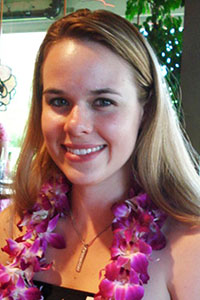 It has been a long but exciting journey that has culminated in acceptance at Western University's Osteopathic program where I will be starting in the summer of 2009.
It has been a long but exciting journey that has culminated in acceptance at Western University's Osteopathic program where I will be starting in the summer of 2009.
I started my journey towards med school in high school, where I took AP Biology, honors Chemistry, Anatomy and Physiology in my junior and senior years. Saddleback and IVC provided a solid ground of the basic sciences, where I graduated cum laude with an A.A. in 2005.
Throughout my community college years, I attended any meeting pertaining to medicine that I could find. I joined AMSA-UCI, volunteered at Orangewood Childrens' home and signed up for the annual “Women in Medicine” conference. I also was fortunate to attend a 14-day medical tour of Australia where I got to see the med schools on the east coast and learn about the Royal Flying Doctors.
I volunteered as a Clinical Care Extender at Hoag for 400+ hours where I experienced seven different departments, from gynecology/urology to the main operating room. A summer research opportunity allowed me to participate in cancer research at City of Hope's Beckman institute where I completed my project presented results in a poster session to all PhD's at the institute.
The Princeton Review prepared me for the MCAT with a structured review, materials, tests and knowledgeable instructors. I got a 30S overall (13 Biological Science, 9 Physical Science, 8 Verbal).
In 2007, I applied to 29 allopathic schools and was rejected by all of them – I didn't even get an interview. My MCAT and GPA were strong, and I graduated cum laude with a double major in Communications (Advertising) and Biological Science (Molecular Biology and Biotechnology). My personal character was strong because I was born and raised in South Africa – the only explanation for my rejections was that I submitted my application late.
After reconfirming my dedication for becoming a doctor and realizing my pull toward the more well-rounded education of osteopathic medicine, I decided to apply to again, this time to 5 osteopathic schools.
On my year off, I was certified as a LifeStyle Educator through Metagenics. I work with patients to change their lifestyle habits concerning nutrition, stress management and exercise. My work has allowed me to experience a “non-hospital” view of medicine.
This year off also allowed me to get involved in Dr. Tolmasky's lab with antibiotic resistance research. I am hoping to complete my project before I jump into WesternU's 2013 DO class!
I am relieved to have finally reached a new beginning and feel fortunate to have had the support of my friends, fellow students and the guidance of many faculty members.
Some tips for those on your journey: don't give up, take as many practice MCAT's as you can stomach, get involved with volunteering (it balances the heavy coursework), apply early and always take advantage of the health professions advising office!
